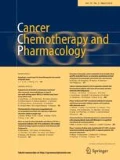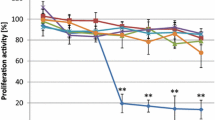Abstract
Purpose
Cancers are methionine (MET) and methylation addicted, causing them to be highly sensitive to MET restriction. The present study determined the efficacy of restricting MET with oral-recombinant methioninase (o-rMETase) and the DNA methylation inhibitor, azacitidine (AZA) on a chemotherapy-resistant osteosarcoma patient-derived orthotopic xenograft (PDOX) mouse model.
Methods
The osteosarcoma PDOX models were randomized into five treatment groups of six mice: control; doxorubicin (DOX) alone; AZA alone; o-rMETase alone; o-rMETase-AZA combination. Tumor size and body weight were measured during the 14 days of treatment.
Results
We found that tumor growth was arrested only by the o-rMETase–AZA combination treatment, as tumors with this treatment exhibited tumor necrosis with degenerative change.
Conclusion
This study suggests that o-rMETase-AZA combination has clinical potential for patients with chemoresistant osteosarcoma.




Similar content being viewed by others
References
Misaghi A, Goldin A, Awad M, Kulidjian AA (2018) Osteosarcoma: a comprehensive review. SICOT J 4:12
Durfee RA, Mohammed M, Luu HH (2016) Review of osteosarcoma and current management. Rheumatol Ther 3(2):221–243
Harrison DJ, Geller DS, Gill JD, Lewis VO, Gorlick R (2018) Current and future therapeutic approaches for osteosarcoma. Expert Rev Anticanc Ther 18(1):39–50
Miwa S, Takeuchi A, Ikeda H, Shirai T, Yamamoto N, Nishida H et al (2013) Prognostic value of histological response to chemotherapy in osteosarcoma patients receiving tumor-bearing frozen autograft. PLoS One 8(8):e71362
Jaffe N (2009) Osteosarcoma: review of the past, impact on the future. The American experience. Cancer Treat Res 152:239–262
Wang Z, Yip LY, Lee JHJ, Wu Z, Chew HY, Chong PKW et al (2019) Methionine is a metabolic dependency of tumor-initiating cells. Nat Med 25(5):825–837
Hoffman RM, Erbe RW (1976) High in vivo rates of methionine biosynthesis in transformed human and malignant rat cells auxotrophic for methionine. Proc Natl Acad Sci USA 73(5):1523–1527
Stern PH, Hoffman RM (1984) Elevated overall rates of transmethylation in cell lines from diverse human tumors. In vitro 20(8):663–670
Stern PH, Wallace CD, Hoffman RM (1984) Altered methionine metabolism occurs in all members of a set of diverse human tumor cell lines. J Cell Physiol 119(1):29–34
Coalson DW, Mecham JO, Stern PH, Hoffman RM (1982) Reduced availability of endogenously synthesized methionine for S-adenosylmethionine formation in methionine-dependent cancer cells. Proc Natl Acad Sci USA 79(14):4248–4251
Hoffman RM, Jacobsen SJ (1980) Reversible growth arrest in simian virus 40-transformed human fibroblasts. Proc Natl Acad Sci USA 77(12):7306–7310
Yano S, Li S, Han Q, Tan Y, Bouvet M, Fujiwara T et al (2014) Selective methioninase-induced trap of cancer cells in S/G2 phase visualized by FUCCI imaging confers chemosensitivity. Oncotarget 5(18):8729–8736
Hoffman RM, Jacobsen SJ, Erbe RW (1979) Reversion to methionine independence in simian virus 40-transformed human and malignant rat fibroblasts is associated with altered ploidy and altered properties of transformation. Proc Natl Acad Sci USA 76(3):1313–1317
Hoffman RM (2015) Development of recombinant methioninase to target the general cancer-specific metabolic defect of methionine dependence: a 40-year odyssey. Expert Opin Biol Ther 15(1):21–31
Kawaguchi K, Han Q, Li S, Tan Y, Igarashi K, Murakami T et al (2019) Efficacy of recombinant methioninase (rMETase) on recalcitrant cancer patient-derived orthotopic xenograft (PDOX) mouse models: a review. Cells 8(5):410
Higuchi T, Kawaguchi K, Miyake K, Han Q, Tan Y, Oshiro H et al (2018) Oral recombinant methioninase combined with caffeine and doxorubicin induced regression of a doxorubicin-resistant synovial sarcoma in a PDOX mouse model. Anticancer Res 38(10):5639–5644
Igarashi K, Kawaguchi K, Kiyuna T, Miyake K, Miyaki M, Yamamoto N et al (2018) Metabolic targeting with recombinant methioninase combined with palbociclib regresses a doxorubicin-resistant dedifferentiated liposarcoma. Biochem Biophys Res Commun 506(4):912–917
Kawaguchi K, Miyake K, Han Q, Li S, Tan Y, Igarashi K et al (2018) Oral recombinant methioninase (o-rMETase) is superior to injectable rMETase and overcomes acquired gemcitabine resistance in pancreatic cancer. Cancer Lett 432:251–259
Miyake K, Kiyuna T, Li S, Han Q, Tan Y, Zhao M et al (2018) Combining tumor-selective bacterial therapy with Salmonella typhimurium A1-R and cancer metabolism targeting with oral recombinant methioninase regressed an Ewing’s sarcoma in a patient-derived orthotopic xenograft model. Chemotherapy 63(5):278–283
Sato T, Issa JJ, Kropf P (2017) DNA hypomethylating drugs in cancer therapy. Cold Spring Harb Perspect Med 7(5):a026948
Gailhouste L, Liew LC, Hatada I, Nakagama H, Ochiya T (2018) Epigenetic reprogramming using 5-azacytidine promotes an anti-cancer response in pancreatic adenocarcinoma cells. Cell Death Dis 9(5):468
Wang X, Chen E, Yang X, Wang Y, Quan Z, Wu X et al (2016) 5-azacytidine inhibits the proliferation of bladder cancer cells via reversal of the aberrant hypermethylation of the hepaCAM gene. Oncol Rep 35(3):1375–1384
Kratzsch T, Kuhn SA, Joedicke A, Hanisch UK, Vajkoczy P, Hoffmann J et al (2018) Treatment with 5-azacitidine delay growth of glioblastoma xenografts: a potential new treatment approach for glioblastomas. J Cancer Res Clin Oncol 144(5):809–819
Connolly RM, Li H, Jankowitz RC, Zhang Z, Rudek MA, Jeter SC et al (2017) Combination epigenetic therapy in advanced breast cancer with 5-azacitidine and entinostat: a phase II national cancer institute/stand up to cancer study. Clin Cancer Res 23(11):2691–2701
Festuccia C, Gravina GL, D’Alessandro AM, Muzi P, Millimaggi D, Dolo V et al (2009) Azacitidine improves antitumor effects of docetaxel and cisplatin in aggressive prostate cancer models. Endocr Relat Cancer 16(2):401–413
Miyake K, Kiyuna T, Kawaguchi K, Higuchi T, Oshiro H, Zhang Z et al (2019) Regorafenib regressed a doxorubicin-resistant Ewing’s sarcoma in a patient-derived orthotopic xenograft (PDOX) nude mouse model. Cancer Chemother Pharmacol 83(5):809–815
Higuchi T, Miyake K, Oshiro H, Sugisawa N, Yamamoto N, Hayashi K et al (2019) Trabectedin and irinotecan combination regresses a cisplatinum-resistant osteosarcoma in a patient-derived orthotopic xenograft nude mouse model. Biochem Biophys Res Commun 513(2):326–331
Tan Y, Xu M, Tan X, Tan X, Wang X, Saikawa Y et al (1997) Overexpression and large-scale production of recombinant l-methionine-alpha-deamino-gamma-mercaptomethane-lyase for novel anticancer therapy. Protein Expr Purif 9(2):233–245
Higuchi T, Miyake K, Sugisawa N, Oshiro H, Zhang Z, Razmjooei S et al (2019) Olaratumab combined with doxorubicin and ifosfamide overcomes individual doxorubicin and olaratumab resistance of an undifferentiated soft-tissue sarcoma in a PDOX mouse model. Cancer Lett 451:122–127
Chen XG, Ma L, Xu JX (2018) Abnormal DNA methylation may contribute to the progression of osteosarcoma. Mol Med Rep 17(1):193–199
Xu J, Li D, Cai Z, Zhang Y, Huang Y, Su B, Ma R (2017) An integrative analysis of DNA methylation in osteosarcoma. J Bone Oncol 9:34–40
Zhang K, Gao J, Ni Y (2017) Screening of candidate key genes associated with human osteosarcoma using bioinformatics analysis. Oncol Lett 14(3):2887–2893
Diao C, Xi Y, Xiao T (2018) Identification and analysis of key genes in osteosarcoma using bioinformatics. Oncol Lett 15(3):2789–2794
Acknowledgements
This paper is dedicated to the memory of Reese Imhoff.
Author information
Authors and Affiliations
Corresponding authors
Ethics declarations
Conflict of interest
The authors declare that they have no conflict of interest. AntiCancer Inc. uses PDOX models for contract research. QH and YT are employees of AntiCancer Inc. TH, NS, JY, HO, NY, KH, HK, SM, KI and RMH are or were unsalaried associates of AntiCancer Inc.
Ethical approval
The mouse investigations were carried out using an AntiCancer, Inc. Institutional Animal Care and Use Committee (IACUC) protocol specifically approved for this study as previously described and as per the principles and procedures provided in the National Institutes of Health (NIH) Guide for the Care and Use of Animals under Assurance Number A3873-1 [26, 27].
Informed consent
Written informed consent was obtained from the patient as part of a UCLA Institutional Review Board approved protocol (IRB#10-001857).
Additional information
Publisher's Note
Springer Nature remains neutral with regard to jurisdictional claims in published maps and institutional affiliations.
Rights and permissions
About this article
Cite this article
Higuchi, T., Sugisawa, N., Yamamoto, J. et al. The combination of oral-recombinant methioninase and azacitidine arrests a chemotherapy-resistant osteosarcoma patient-derived orthotopic xenograft mouse model. Cancer Chemother Pharmacol 85, 285–291 (2020). https://doi.org/10.1007/s00280-019-03986-0
Received:
Accepted:
Published:
Issue Date:
DOI: https://doi.org/10.1007/s00280-019-03986-0




